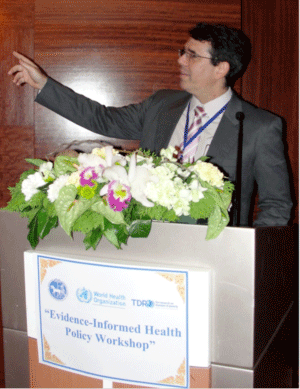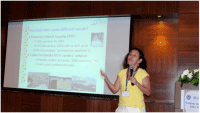
 (left) Dr. Jorge Barreto, National Council of Municipal Secretaries of Health, Brasil
(left) Dr. Jorge Barreto, National Council of Municipal Secretaries of Health, Brasil
The World Health Organization (WHO), the Special Programme for Research and Training in Tropical Diseases (TDR), and the London School of Hygiene and Tropical Medicine (LSHTM), convened an expert group to discuss␣the value of the research on implementation; one that generates knowledge on how to integrate the results of research on health in the health care systems.
These experts met from 14 to 16 March 2011 in Bangkok, Thailand; to explore the transformational role on the health system is the implementation of the results of research on diagnostic tests. They discussed the challenges found in knowledge translation, and shared experiences in transformational health systems initiatives. During the event the positive experience of Evidence Informed Policy Network (EVIPNet) was presented.
The Coordinator of the World Health Report 2012, Dr. Tikki Pang, highlighted how when scientific knowledge, political, and social participation work jointly, changes can be achieved. For its part, the Senior Adviser for the Research Promotion & Development team at PAHO, Dr. Luis Gabriel Cuervo, illustrated the systems approach by which the translation of knowledge becomes a catalyst for the strengthening of National Health Research systems, as applied in PAHO. This approach was illustrated with specific examples brought by the Extraordinary Secretary for Science and Technology of the National Council of Municipal Secretaries of Health from Brazil, Mr. Jorge Barreto, who shared his experience as Secretary of health of Piripirí and summed up how EVIPNet Brazil provided effective solutions for him as a policy maker throughout the decision making processes, offering a comprehensive and integral vision to define health policies. For example: the policy briefs about implications of relevant options to improve primary health care at the municipal level and the use of "deliberative dialogues" to get an informed perspective of the views from different stakeholders and their reactions to the evidence about each policy option. In the words of Barreto: "Our experience with deliberative dialogues has been sensational! The use of evidence allowed a rich and informed discussion with civil society when we were looking at options to attract competent professionals, thus allowing us to enhance the delivery of primary health care. It presented me with the implications of three options for strategies that were supported by research evidence allowing us to make an informed decision with the municipal Council. Subsequent evaluations showed that we made sound choices".1
The event also highlighted related contributions by BIREME, such as the Evidence Portal. Other experiences from the Americas were presented at this international event. Among them, the programs of rapid diagnosis to prevent congenital syphilis implemented in Haiti, (presented by the Dr. Rosanna Peeling), Peru(Drs. Patricia Garcia, and José Calderón Yberico), and Brazil (Drs. Adele Benzaken and Valdir Pinto).
The meeting resulted in a series of concrete proposals that enhance the transformative role offered by research in diagnostic systems of health technologies.

Dra. Patricia García, Escuela de Salud Pública, Universidad Cayetano Heredia, Perú
Prepared by Luis Gabriel Cuervo, Bangkok, 16 de marzo de 2011.(Original in Spanish)



